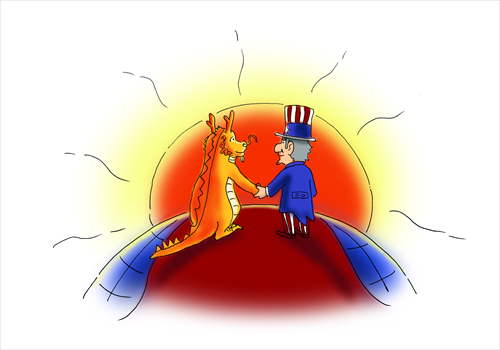Nation’s new global role can offset bilateral differences

Illustration: Liu Rui/GT
While emphasis is naturally placed on the bilateral dimension of Sino-US relations following the meeting between presidents Xi Jinping and Barack Obama, there is another issue that deserves attention. This is China's new international role and how it could affect developments on the world stage. As the world is becoming more multilateral or "apolar" according to several politicians and scholars, the room for compromises, partnerships and collective diplomatic initiatives is expanding. Beijing can contribute toward this trend and has already started to do so.
Not surprisingly, the new international role of a rising China is regarded with suspicion by the West. The country is often not trusted while its policies are largely considered as tools used by its administration to serve political and foreign policy goals.
The "One Belt, One Road" initiative, for instance, is regarded as an opportunity for it to find more allies in Eurasia and expand its global influence. Further to this, even China's significant contribution to UN peacekeeping operations is associated with alleged interests in the countries and areas where these operations are taking place.
This criticism goes hand in hand with the general Western interpretation of China and its perceived motivations. But this criticism fails to acknowledge the new reality that the US has to work with China - either bilaterally or multilaterally - to address international challenges. US National Security Advisor Ambassador Susan Rice shares this view by explicitly saying that "when China and the US work together, the world is more secure and more prosperous."
There is no better example to highlight China's new international role than the fight against terrorism and the Islamic State (IS). The country is highly concerned about this threat leading to attacks on its own soil, in Xinjiang. In that regard, Beijing is theoretically supportive of the US-coalition activities against IS, although it might more easily join military operations under a UN banner.
China's interest in fighting against terror and protecting Xinjiang goes beyond the need to take security measures to that of working toward political stability. The country is much closer to the main base of IS in comparison to the US and is and could be more directly threatened. This said, Beijing is highly interested in facilitating - if not in mediating - to increase chances for peace settlements in countries such as Syria.
Moreover, China's diplomacy also has a significant impact on efforts of the international community to reach other critical agreements. The breakthrough in Iran's nuclear program - for which the country deserves some credit - had seemed almost unthinkable a few years ago. Optimistic thinkers believe that this could set an exemplary case for international negotiations on the nuclear program of North Korea.
Apart from international affairs, Beijing's promising contribution to world growth should not be ignored. The establishment of the Asian Infrastructure Investment Bank - in which several European countries such as Britain, France and Germany participate - constitutes a new instrument that might finance infrastructure and development projects. Although the US has not welcomed this initiative, the usage of the new financial mechanism will be a reference point from next year onward.
The new international role of China can generate optimism that antagonism with the US on various fronts will be eliminated. It creates hope through which the existing bilateral differences will be managed and subsequently world challenges will be addressed efficiently.
It is not only China and the US which will benefit from enhanced cooperation but also the entire planet as these two are able to offer together tangible solutions to problems.
All in all, history can show the way. China and the US cooperated against the "Axis" in WWII despite their contradictory ideologies. Some decades later, a new chapter opens.
The author is a lecturer at the European Institute in Nice, France. opinion@globaltimes.com.cn